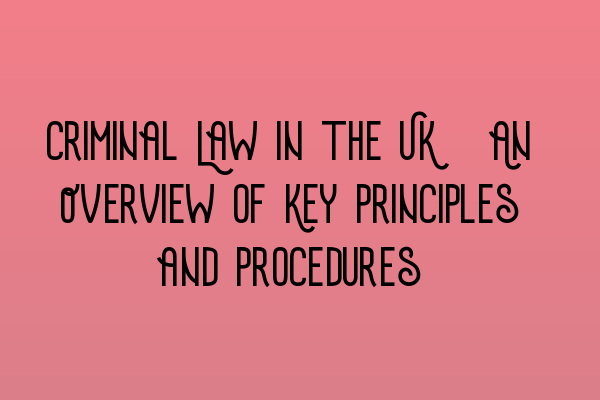Criminal Law in the UK: An Overview of Key Principles and Procedures
As a leading criminal law firm at SQE Criminal Law & Practice Law UK, we understand the importance of being well-informed about the key principles and procedures governing criminal law in the UK. Whether you are a legal professional, aspiring solicitor, or simply interested in understanding how the criminal justice system works, this comprehensive overview will provide you with the necessary insights.
Introduction to Criminal Law
Criminal law encompasses the body of laws that deal with crimes committed against society as a whole. It defines various offenses and establishes the procedures for prosecuting individuals who violate those laws. Understanding criminal law is essential for maintaining public order, safeguarding individual rights, and ensuring justice is served.
When it comes to criminal law in the UK, there are several key principles and procedures that form the foundation of the legal system. Let’s explore them in detail.
Key Principles of Criminal Law
One of the fundamental principles of criminal law is the presumption of innocence. This principle holds that a person is considered innocent until proven guilty beyond a reasonable doubt. It places the burden of proof on the prosecution to establish the guilt of the accused.
In addition, criminal law follows the principle of legality, which means that there must be clear and unambiguous laws in place that define criminal offenses. These laws specify the elements of each offense and ensure that individuals are aware of what constitutes a crime.
Furthermore, the principle of proportionality ensures that the punishment for a crime is appropriate and proportionate to the severity of the offense committed. Sentencing guidelines and considerations are applied to achieve this balance.
Another essential principle is the right to a fair trial. This includes the right to legal representation, the right to know the charges and evidence against you, and the right to examine and cross-examine witnesses. The trial process must be conducted impartially, and defendants have the right to present their defense and call witnesses in their support.
Procedures in Criminal Law
In the UK, criminal proceedings typically begin with the investigation and gathering of evidence by law enforcement agencies. If they believe there is enough evidence to support the charges, they will submit the case to the Crown Prosecution Service (CPS) for further evaluation.
The CPS then decides whether to proceed with the prosecution. If they do, the accused will be brought before a court, and the trial process begins. During the trial, the prosecution and defense present their case, after which the judge or jury decides the verdict.
If the accused is found guilty, the court proceeds to sentencing, where the appropriate punishment is determined based on the circumstances of the case and the applicable laws.
Conclusion
Understanding key principles and procedures in criminal law is crucial for anyone involved or interested in the legal system. It ensures fairness, upholds human rights, and maintains the integrity of the criminal justice process in the UK.
If you are preparing for the SQE exam or seeking further information about criminal law in the UK, we recommend checking out our related articles:
- SQE Exam Prep: Essential Study Materials for Aspiring Solicitors
- Demystifying the Solicitors Qualifying Examination Format
- SQE Exam for International Lawyers: Challenges and Success Strategies
- LLC Formation Made Simple: Step-by-Step Guide for UK Entrepreneurs
- LLC Formation: A Step-by-Step Guide for UK Entrepreneurs
For expert legal advice and assistance with criminal law matters, feel free to contact SQE Criminal Law & Practice Law UK.
